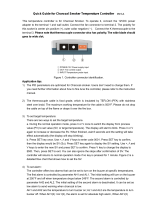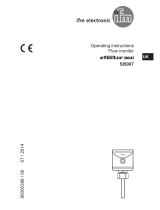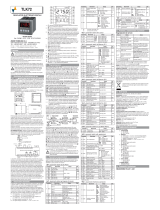Page is loading ...

T
he TSS2 is an electronic temperature controller designed for ON/OFF control or
N
eutral Area Control. They can be provided with 1 or 2 probes (PTC or NTC)
a
ccording to parameter P5 and it provides two output relays plus an alarm buzzer.
The unit controls cooling, heating or both, since its relays can be setup for direct or
reverse operation. The user is able to program 34 different parameters including
set points, hysteresis, configuration of alarms and probe adjustment using the
silicone front keypad. The unit features error warning and password protection.
Each suffix can take the following values:
Note: Unit must be mounted away from vibration, impacts, water and corrosive
gases.
• Cut hole in panel 71 x 29 mm (2.80 x 1.14 inches).
• Apply silicone (or rubber gasket) around the perimeter of the hole to prevent
leakage.
• Insert unit into hole of panel.
• Slide removable fitting clips onto unit from the back until secure to panel.
• Wiring diagram is displayed on the top of the unit.
• Note: DO NOT INSTALL PROBE CABLE NEAR POWER CABLES.
Series TSS2 Dual Stage Temperature Switch
Specifications - Installation and Operating Instructions
Bulletin E-90-TSS2
SPECIFICATIONS
Probe Range:
P
TC: -58 to 302°F (-50 to 150°C);
N
TC: -58 to 230°F (-50 to 110°C).
Input:
PTC: 1000Ω @ 25°C;
NTC: 10 kΩ @ 25°C.
Outputs: OUT1 - SPDT relay rated 16A @ 240 VAC resistive; OUT2 - SPDT
relay rated 8A @ 240 VAC resistive.
Horsepower Rating (HP): 1 HP (OUT1).
Power Requirements: 115 VAC, 230 VAC, 12 VAC/VDC or 24 VAC/VDC
(depending on model).
Accuracy: 1% FS.
Display: 3-digit and sign, red LED.
Resolution: 0.1° (<100°); 1° (≥100°).
Memory Backup: Nonvolatile memory.
Temperature Limit: Ambient: 32 to 158°F (0 to 70°C).
Storage Temperature: -4 to 176°F (-20 to 80°C).
Dimensions: 3 x 1-27/64 x 2-7/16 in.
Front Panel Rating: IP64.
Weight: 2.3 oz (65 g).
Agency Approvals: CE, cURus.
Maintenance, cleaning and repair
After final installation of the unit, no routine maintenance is required. Clean the
surface of the display controller with a soft and damp cloth. Never use abrasive
detergents, petrol, alcohol or solvents. All repairs must be made by authorized
personnel.
LOVE CONTROLS DIVISION
Phone: 219/879-8000 www.love-controls.com
DWYER INSTRUMENTS INC.
Fax: 219/872-9057 e-mail:[email protected]
P.O. BOX 338 - MICHIGAN CITY, INDIANA 46360, U.S.A.
°C
W
IRING DIAGRAM
B
LUE BUTTONS
3
[76.2]
1
-27/64
[
36.12]
1-9/64
[28.97]
2
-7/16
[
61.91]
MODEL CODE
DISPLAY COLOR
0=RED
UNITS
0 = °F
1 = °C
SUPPLY VOLTAGE
1 = 115 VAC
2 = 230 VAC
3 = 12 VAC/DC
4 = 23 VAC/DC
OUTPUTS
2 = 2 OUTPUTS
TSS2 –

L
ist of parameters
D
escription Units Range
S
P1 Set Point 1 Degrees r4 to r6
S
P2 Set Point 2 Degrees r5 to r7
r0 Dependency SP1-SP2 Range ind/dep
r1 Differential for SP1 Degrees 0.1 to 20.0
r2 Differential for SP2 Degrees 0.1 to 20.0
r
3 Band differential Degrees 0.1 to 20.0
r
4 Lowest value for SP1 Degrees -99.9 to r6
r
5 Lowest value for SP2 Degrees -99.9 to r7
r
6 Highest value for SP1 Degrees r4 to 302
r7 Highest value for SP2 Degrees r5 to 302
r8 Regulation or operating mode Range On1/On2/nEU
A0 Alarm differential Degrees 0.1 to 20.0
A
1 Maximum alarm probe 1 (1) Degrees 0.1 to 99.9
A
2 Maximum alarm probe 2 (2) Degrees 0.1 to 99.9
A
3 Minimum alarm probe 1 (1) Degrees 0.1 to 99.9
A4 Minimum alarm probe 2 (2) Degrees 0.1 to 99.9
A5 Alarm verification time h-m (*) 0.0 to 18.0
A6 Alarm probe 1 selection Range AHL/Ano/AH/AL
A7 Alarm probe 2 selection Range AHL/Ano/AH/AL
c
0 Minimum relay stop time Minutes 0 to 240
c
1 Operation relay 1 Range dir/inv
c
2 Operation relay 2 Range dir/inv
c3 Default operation relay 1 Range Opn/Clo
c4 Default operation relay 2 Range Opn/Clo
P0 Temperature scale selection Range ºC/ºF
P1 Calibration of probe 1 Degrees -20.0 to 20.0
P
2 Calibration of probe 2 Degrees -20.0 to 20.0
P
3 Decimal point Range no/yes
P
4 Probe to be displayed Range sd1/sd2
P5 Number of probes Range 1/2
H0 Reprogramming Range 0
H1 Keyboard protection Range no/yes
H2 Operation LED OUT1 Range dir/inv
H3 Operation LED OUT2 Range dir/inv
H4 Address for serial communication Numeric 0 to 999
H5 Access code to parameters Numeric 0 to 999
H6 Probe type Range Ptc/Ntc
(*)h-m are data in format XX.Y where XX are hours and Y tens of minutes.
(1)referred to set 1.
(2)referred to set 2.
Parameter descriptions
SP1 = Operation order of relay 1. Specifies the ON/OFF point of relay 1. Variable
between r4 and r6.
SP2 = Operation order of relay 2. Specifies the ON/OFF point of relay 2. Variable
between r5 and r7.
r0 = Dependency between SP1 and SP2. Only for mode ONOFF1
ind = order for relay 2, SP2.
dep = order for relay 2, SP1+SP2.
r1 = Differential or hysteresis for relay 1. Temperature differential between ON/OFF
of relay 1 in ON/OFF control.
r2 = Differential or hysteresis for relay 2. Temperature differential between ON/OFF
of relay 2 in ON/OFF control.
r3 = Band differential. Temperature differential between ON/OFF of relays 1 and 2
in neutral area control. For relay 1 it is added to SP1 and for relay 2 it is subtracted
from SP1.
r4 = Lowest value for SP1.
r5 = Lowest value for SP2.
r6 = Highest value for SP1.
r7 = Highest value for SP2.
r8 = Regulation or operating mode. Selection of the operating mode.
A0 = Alarm differential. It is the temperature differential between the alarm On and
Off cycle.
A1 = Maximum alarm probe1.
A2 = Maximum alarm probe2.
Maximum alarm ON when probe 2 higher than SP2+A2
Maximum alarm OFF when probe 2 lower than SP2+A2-A0.
A3 = Minimum alarm probe1.
Minimum alarm ON when probe 1 lower than SP1-A3
Minimum alarm OFF when probe 1 higher than SP1-A3+A0.
A
4 = Minimum alarm probe2.
M
inimum alarm ON when probe 2 lower than SP2-A4
M
inimum alarm OFF when probe 2 higher than SP2-A4+A0.
A
5 = Alarm verification time. Time from the alarm event until it trips.
A6 = Alarm probe 1 selection.
AHL=Maximum and minimum alarm probe 1 enabled.
Ano=No alarms probe 1.
A
H=Maximum alarm probe 1 enabled.
A
L=Minimum alarm probe 1 enabled.
A
7 = Alarm probe 2 selection.
A
HL=Maximum and minimum alarm probe 2 enabled.
Ano=No alarms probe 2.
AH=Maximum alarm probe 2 enabled.
AL=Minimum alarm probe 2 enabled.
c0 = Minimum relay stop time. Minimum time from the disconnection of a relay until
it can be switched on again.
c1 = Operation relay 1. Selection between direct or reverse operation for relay 1.
c2 = Operation relay 2. Selection between direct or reverse operation for relay 2.
c3 = Default operation relay 1. In case of failure of probe 1:
oPn= relay 1 will remain open.
Clo= relay 1 will remain closed.
c4 = Default operation relay 2. In case of failure of probe 1 (for all modes excepting
ON OFF2) or in case of failure of probe 2 (for mode ON OFF2):
oPn= relay 2 will remain open.
Clo= relay 2 will remain closed.
P0 = Temperature scale selection.
P1 = Calibration of probe 1. Offset degrees to be added to probe 1.
P2 = Calibration of probe 2. Offset degrees to be added to probe 2.
P3 = Decimal point. If the displayed value of the probes is desired with decimals or
not.
P4 = Probe to be displayed. Probe always on the display. The other probe can be
seen pressing the keys SET+UP.
sd1= probe 1.
sd2= probe 2.
P5 = Number of probes. If P5=1, there is not ON OFF2 mode. If selected, it will
operate as ONOFF1.
H0 = Reprogramming. Parameter to reprogram the thermostat.
H1 = Keyboard protection.
To change the sets, enter into parameter and exit again. The protection setting
is momentarily released. It switches on again 1 minute after the last time a key
was pressed.
Yes= Keyboard Protected.
No=Keyboard non protected.
H2 = Operation of LED OUT1.
dir = On when relay 1 is ON.
inv = On when relay 1 is OFF.
H3 = Operation of LED OUT2.
dir = On when relay 2 is ON.
inv = On when relay 2 is OFF.
H4 = Serial communication address. Address for computer connection.
H5 = Parameter entry code. Factory set as 0.
H6 = Input probe type selectable between PTC or NTC.

M
essage display
U
nder normal operation, the temperature of the probe selected by P4 will be
d
isplayed, the following messages may also appear:
•
Err Memory reading error.
•ErP Error of the probe not shown on the display.
•AH1 Maximum temperature alarm, probe 1.
•AL1 Minimum temperature alarm, probe 1.
•
AH2 Maximum temperature alarm, probe 2.
•
AL2 Minimum temperature alarm, probe 2.
•
ooo Open probe.
•
--- Shorted probe.
Pressing SET with UP it displays the probe not selected by P4.
When the probe not selected by P4 is displayed, it alternates its value with
message Sd1 or Sd2 depending if it is probe 1 or probe 2.
T
he display blinks when waiting for a value confirmation.
L
ED indications
Out1: Indicates relay 1 On or Off as per parameter H2. If H2=dir, with relay 1 On,
LED lit, if H2=inv, with relay 1 On, LED off. It blinks when SP1 is displayed.
Out2: Indicates relay 2 On or Off as per parameter H3. If H3=dir, with relay 2 On,
LED lit, if H3=inv, with relay 2 On, LED off. It blinks when SP2 is displayed.
S
etting SP1 and SP2
•
Press and release SET. The current value of order 1 is displayed.
SP1 and led OUT1 blink.
• Press UP or DOWN to increase or decrease the value.
• Press SET to confirm the new value. The actual value of order 2 will be displayed,
SP2 and LED OUT2 blink.
•
Press UP or DOWN to increase or decrease the value.
•
Press SET to confirm the new value and exit.
Parameter setup
• Press SET for 8 seconds. Value 0 will blink.
• With UP and DOWN input the code (factory set as 0).
• Press SET to confirm the code. If correct, the label of the first parameter will be
displayed.
• With UP or DOWN go to the desired parameter in the parameter list.
• Press SET to see the value.
• With UP or DOWN change the value to the new value as desired.
• Press SET to confirm and exit again to the parameter list. (Also to exit to the list
without parameter modification.)
• Press SET + DOWN to exit setup or wait for 1 minute.
Resetting the keyboard code
You can setup to 0 the keyboard code switching the unit off and on while pressing
the SET key.
Buzzer disconnection
Pressing SET with DOWN turns off the buzzer alarm. The message of alarm
continue appearing in the display.
R
eprogramming factory values (H0)
•
Access to parameter H0 as explained in parameter setup.
•
Value 0 will be displayed.
•
Press SET for 8 seconds. Pro will be displayed if they have been setup correctly.
•Press SET + DOWN to exit setup or wait for 1 minute.
Description Factory value
S
P1 Set Point 1 10.0
S
P2 Set Point 2 10.0
r
0 Dependency SP1 - SP2 ind
r
1 Differential for SP1 1.0
r2 Differential for SP2 1.0
r3 Band differential 1.0 1.0
r4 Lower value for SP1 -99.9
r
5 Lower value for SP2 -99.9
r
6 Higher value for SP1 99.9
r
7 Higher value for SP2 99.9
r8 Regulation or operating mode On1
A0 Alarm differential 0.1
A1 Maximum alarm probe 1 99.9
A2 Maximum alarm probe 2 99.9
A
3 Minimum alarm probe 1 99.9
A
4 Minimum alarm probe 2 99.9
A
5 Alarm verification time 18.0
A6 Alarm probe 1 selection AHL
A7 Alarm probe 2 selection AHL
c0 Minimum relay stop time 0
c1 Operation relay 1 dir
c
2 Operation relay 2 dir
c
3 Default operation relay 1 Opn
c
4 Default operation relay 2 Opn
P0 Temperature scale selection ºC
P1 Calibration of probe 1 0.0
P2 Calibration of probe 2 0.0
P3 Decimal point yes
P4 Probe to be displayed sd1
P5 Number of probes 2
H0 Reprogramming 0
H1 Keyboard protection no
H2 Operation LED OUT1 dir
H3 Operation LED OUT2 dir
H4 Address for serial communication 0
H5 Access code to parameters 0
H6 Probe type Ptc

O
perating modes
M
ode ON OFF1 (On1) with r0=ind.
R
elay 1 with c1=dir.
T
emperature of probe 1 >= SP1+r1 -->relay 1 ON
Temperature of probe 1 <= SP1 -->relay 1 OFF
Relay 1 with c1=inv.
Temperature of probe 1 <= SP1-r1 -->relay 1 ON
Temperature of probe 1 >= SP1 -->relay 1 OFF
Relay 2 with c2=dir.
Temperature of probe 1 >= SP2+r2 -->relay 2 ON
Temperature of probe 1 <= SP2 -->relay 2 OFF
Relay 2 with c2=inv.
Temperature of probe 1 <= SP2-r2 -->relay 2 ON
Temperature of probe 1 >= SP2 -->relay 2 OFF
Mode ON OFF1 (On1) with r0=dep.
Output 1 works as in independent ON/OFF control (Figure 1 and 2), but output 2
works as follows:
Relay 2 with c2=dir.
Temperature of probe 1 >= SP1+SP2+r2 -->relay 2 ON
Temperature of probe 1 <= SP1+SP2 -->relay 2 OFF
R
elay 2 with c2=inv.
T
emperature of probe 1 <= SP1+SP2-r2 -->relay 2 ON
T
emperature of probe 1 >= SP1+SP2 -->relay 2 OFF
Mode ON OFF2 (On2)
O
utput 1 works as in independent ON/OFF control (Figure 1 and 2), but output 2
w
orks as follows:
R
elay 2 with c2=dir.
Temperature of probe 2 >= SP2+r2 -->relay 2 ON
Temperature of probe 2 <= SP2 -->relay 2 OFF
R
elay 2 with c2=inv.
T
emperature of probe 2 <= SP2-r2 -->relay 2 ON
Temperature of probe 2 >= SP2 -->relay 2 OFF
Neutral Area Mode (nEU)
Relay 1
Temperature of probe 1 >= SP1+r3 -->relay 2 ON
Temperature of probe 1 <= SP1 -->relay 2 OFF
Relay 2
Temperature of probe 1 <= SP1-r3 -->relay 2 ON
Temperature of probe 1 >= SP1 -->relay 2 OFF
Operation in case of error.
If probe 1 fails, the operation is through c3. (See Parameter description.)
If probe 2 fails, the operation is through c4. (See Parameter description.)
In case of memory failure, both relays will remain open.
©Copyright 2014 Dwyer Instruments, Inc. Printed in U.S.A. 2/14 FR# R0-443509-00 Rev.3
LOVE CONTROLS DIVISION
Phone: 219/879-8000 www.love-controls.com
DWYER INSTRUMENTS INC.
Fax: 219/872-9057 e-mail:[email protected]
P.O. BOX 338 - MICHIGAN CITY, INDIANA 46360, U.S.A.
/



